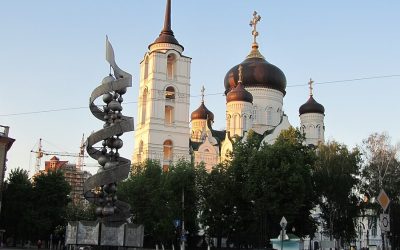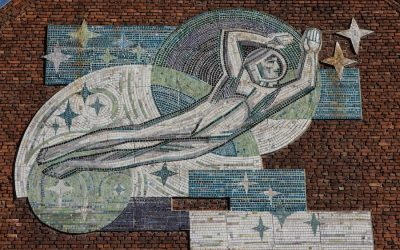The government may be able to censor research activities at universities, but this will not stop the discussion of scientific issues on independent platforms.
Petr Torkanovsky
Photo: Researchers create para-academic channels—grassroots communities, reading groups, chats, and websites—to share experiences and academic discussions while bypassing censorship. Photo by Dimitri Karastelev on Unsplash
Russian universities have been restricting the academic freedom of social science researchers and philosophers for many years. At the same time, this is not always the prerogative of security forces associated with universities or government agencies looking for “untrustworthy” authors of scientific publications.
Early-career scholars and students often experience gaslighting, self-censorship, and a lack of professionalism by academic supervisors or university administrators.
It is possible to distinguish at least 4 levels of restrictions that are imposed on the work of researchers and students:
1. Restrictions on framework
Not all research perspectives or frameworks recognized by the global scientific community are accessible to Russian scholars.
For example, feminist research is often discriminated against. Despite the fact that there is no official ban on the use of feminist approaches in the social sciences in Russia (albeit that in April 2023 there were rumors about a bill being prepared that would recognize feminism as an “extremist ideology”), employees of Russian universities often do not understand the topic or simply do not want to deal with potentially politicized works.
Researchers using a queer lens or studying the lives of LGBTQ+ people find themselves in an even more dire situation. Universities may deny them the opportunity to conduct research for fear of government reprisals.
2. Restrictions on topic
Russian researchers are also often limited in the choice of topics for their research.
For example, academic advisors may refuse to allow students to study topics related to the activities of Russian oppositionists or the work of independent media. In the past, universities have also shut down programs on potentially “dangerous” topics, such as democracy and human rights.
3. Restrictions on data
Social scientists working in Russia know that data on certain topics is classified—or simply impossible to collect.
This is particularly true of statistical data—for example, information about Russian military losses in peacetime. The fieldwork of qualitative researchers is also under threat from repressive laws, such as the “anti-fake” law concerning the Russian military.
4. Restrictions associated with human factors
Even politically neutral research, such as studies related to modern philosophical theories, may be restricted due to a lack of competent academic personnel. Given that a significant portion of the senior academic staff at Russian universities do not speak foreign languages and fundamentally adhere to the policy of “isolationism,” students interested in modern theories are forced to choose more conventional and less interesting topics for their work.
Para-Academic Initiatives as Research Lenses
Governments and universities can censor institutionalized research, but they cannot prevent people from discussing issues and academic texts that interest them on independent platforms.
In Russia, the combination of public demand for scientific knowledge and state censorship has led to the spread of para-academic initiatives: grassroots communities, reading groups, channels, chats, and websites that scholars create for communication, exchanging experiences, and academic discussions.
About Terminology
The terms “para-academic knowledge production” and “para-academic communities” are used by scholars to refer to “collections of people and practices that exist simultaneously within, outside, and alongside conventional academia.”
In the modern European and American academic context, this is often the name given to initiatives that bring together talented researchers who cannot find a place in universities due to an unstable academic market; or those who combine teaching “conventional” subjects at universities and “less conventional” ones at alternative sites.
The Soviet Driver
In European and American science, the key driver for the emergence of para-academic initiatives was neoliberal economic policy. In the Russian context, the political and cultural characteristics of the academic environment play a more important role.
The production of scientific knowledge is affected by academic censorship and self-censorship.
In addition, it can be assumed that the intensive development of para-academic projects has been influenced by the Humboldtian educational tradition, which migrated to Soviet and then Russian education. It postulates that education (primarily higher education) has instructional and general educational functions.
The Soviet image of an “intellectual” is someone who is not only a professional in his field, but also a person with a broad and well-rounded education—someone well-versed in science, culture, art, politics, and other areas of life that are not necessarily directly related to his work.
This idea of the ultimate goal of education, coupled with the high centralization of scientific life and stable informal connections between researchers, has resulted in social scientists taking an interest in the work of colleagues from related disciplines.
In particular, but not exclusively, this concerns work related to fundamental and contemporary social theories and philosophies. Young sociologists read modern philosophers; young anthropologists follow what political scientists and literary scholars write.
The Geography of Para-Academic Communities
In itself, the emergence of para-academic communities under conditions of political censorship and intensive state propaganda is not a uniquely Russian story.
Initiatives that can be classified as para-academic arose, for example, in Czechoslovakia after the Soviet invasion of 1968 and Poland in the late 1970s. In the 21st century, a proliferation of para-academic initiatives in which researchers can work on topics marginalized in academia can be seen in Türkiye. Incidentally, the list of these topics largely coincides with the topics that are often considered “undesirable” to study in Russia.
What Russian Initiatives Can Be Called Para-Academic?
There is no single list of para-academic initiatives. New grassroots research collectives appear every day, and old ones periodically shut down for a variety of reasons.
Nevertheless, in the Russian context, several key types of para-academic initiatives can be identified:
1. Author initiatives
Russian researchers, including those working or studying abroad, often maintain their own blogs or channels on Telegram. Although the topics of these channels can be quite niche (for example, “experimental theology in an object-oriented perspective” or “Latin American anthropology”), some channels have thousands of subscribers.
2. Collective initiatives devoted to concrete topics
Para-academic communities are often initiated by scholars who coalesce around a common interest in a particular social theory or research lens (e.g., “left-wing accelerationism” or “ethnomethodology”).
3. Collective educational initiatives
These initiatives are created by researchers for educational purposes. They include, among others, the Free University and the New School of Political Science.
4. Collective scientific initiatives
These initiatives are aimed primarily at the production of original scientific knowledge. One example is the Laboratory of Public Sociology, which conducts independent sociological research; another is the Posthuman Studies Lab collective, which studies non-human actors in the post-Soviet space.
Why Study Para-Academic Initiatives?
One of the potential criticisms of para-academic initiatives relates to their “scientific-ness.”
Members of para-academic initiatives in Russia, as in other countries, often engage in practices that are characteristic of scientific work in the social sciences—they gather in reading groups to collectively discuss materials and theories, write and publish their own work based on the concepts of other academics, and so on.
That being said, turning away from their institutional affiliations has also meant turning away from strict adherence to scientific standards. For instance, articles published by para-academic communities on social media and other online platforms are, naturally, not subject to a rigorous double-blind peer review process.
As such, can para-academic initiatives be considered part of the scientific community? And if not, then why pay attention to them?
The new knowledge produced by para-academic projects does not really meet all the formal criteria of “scientificness.” However, it is important to keep in mind that in authoritarian countries, ideology and social science can be closely linked. When universities open programs in disciplines like “western studies” and professors view Scopus and Web of Science as instruments of pressure on Russia and discuss the introduction of subjects like “patriotism” to the curriculum, formal affiliation with academic institutions ceases to be a guarantee of the quality of scientific work.
There are at least three reasons to explore para-academic initiatives:
Scientific reasons. Academic knowledge does not exist in a vacuum. As modern studies of social knowledge show, the content of scientific publications is influenced by a huge number of factors, from the specific works a scholar has read and their background to the way they relate to their romantic partners.
The para-academic and academic communities in Russia are closely intertwined. The niche personal interests of researchers sometimes give rise to academic programs, while social media controversy serves as a pretext for revisiting classic debates in academic journals.
Political reasons. According to Dominik Zelinsky, who studied underground philosophical circles in Czechoslovakia in the late 1960s, members of informal para-academic initiatives often use their participation to build political capital. After the collapse of authoritarian systems, they may become representatives of the new political elite.
In addition, students and young academic researchers are often one of the key drivers of political change. Studying their interests and demands allows us to get a more complete picture of the political climate of the region.
Regionalist reasons. Studying exclusively institutionalized science in authoritarian countries such as Russia may lead scientists to false conclusions about the state of regional science and the interests of scientists.
For example, an analysis of academic articles published after the invasion of Ukraine may show that researchers are not interested in critical thinking about the war or other criticism of the political regime. In reality, however, the lack of publications speaks not so much to the actual interests of scientists as to censorship in academia (which scientists may or may not be able to bypass). This may seem obvious, but in the Russian context, researchers have already speculated about the potential “end of Russian social sciences” in light of growing ideologization and censorship in academia.
The study of para-academic projects, with more general attention paid to the complex practices of scientific knowledge production, is an antidote to the simplifications often inherent in research in authoritarian countries.





0 Comments